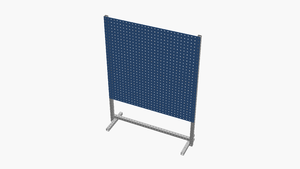Sign boards: Difference between revisions
From
No edit summary |
No edit summary |
||
| (5 intermediate revisions by the same user not shown) | |||
| Line 1: | Line 1: | ||
{{Projects infobox | {{Projects infobox | ||
|image | |image = Sign-board.scad.png | ||
| | |designers = [[User:Dinosaur|Mikey]], [[User:Tim|Timothy Schmidt]] | ||
|date | |date = 2018 | ||
|tools | |vitamins = | ||
|parts | |materials = | ||
|techniques | |transformations = | ||
|git | |lifecycles = | ||
| | |tools = [[Wrenches]] | ||
|parts = [[Frames]], [[Nuts]], [[Bolts]], [[End caps]], [[Plates]] | |||
|techniques = [[Tri joints]], [[Shelf joints]] | |||
|git = | |||
|files = | |||
|suppliers = | |||
}} | }} | ||
| Line 14: | Line 19: | ||
=Introduction= | =Introduction= | ||
A whiteboard (also known by the terms marker board, dry-erase board, dry-wipe board, and pen-board) is a glossy, usually white surface for making nonpermanent markings (an evolved version of the blackboard). Whiteboards are analogous to blackboards, but with a smoother surface allowing rapid marking and erasing of markings on their surface. The popularity of whiteboards increased rapidly in the mid-1990s and they have become a fixture in many offices, meeting rooms, school classrooms, and other work environments. | |||
=Challenges= | =Challenges= | ||
| Line 20: | Line 26: | ||
=References= | =References= | ||
* [https://en.wikipedia.org/wiki/Whiteboard Wikipedia: Whiteboard] | |||
Latest revision as of 18:00, 23 October 2021
Project: Sign boards
| Designers: | Mikey, Timothy Schmidt |
|---|---|
| Tools: | Wrenches |
| Parts: | Frames, Nuts, Bolts, End caps, Plates |
| Techniques: | Tri joints, Shelf joints |
Introduction
A whiteboard (also known by the terms marker board, dry-erase board, dry-wipe board, and pen-board) is a glossy, usually white surface for making nonpermanent markings (an evolved version of the blackboard). Whiteboards are analogous to blackboards, but with a smoother surface allowing rapid marking and erasing of markings on their surface. The popularity of whiteboards increased rapidly in the mid-1990s and they have become a fixture in many offices, meeting rooms, school classrooms, and other work environments.
